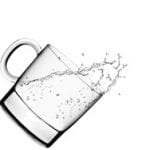What is dehydration?
Dehydration is what occurs when the amount of water leaving your body exceeds the amount of fluid you consume. Believe it or not, one of the first signs that you’ve started to become dehydrated is thirst. Doctors say that if you wait until you’re thirsty to have a drink, you’ve waited too long. How many of us stay hydrated enough to avoid the feeling of thirst? This may mean drinking larger amounts of water before a workout or before spending time outdoors in warm weather.
Some of the more serious symptoms of dehydration include muscle cramps, dry mouth, the inability to tears or sweat, nausea, lightheadedness, heart palpitations, confusion, weakness, dark urine and/or a decreased need to urinate. Severe dehydration, if left untreated, can lead to coma, organ failure, and even death.
Summer is the most dangerous season for dehydration
While dehydration can occur at any time of year, some conditions or activities can contribute to a rapid loss of water from the body, requiring you to drink more in order to stay balanced. It is no wonder dehydration happens more often in summer, because it is usually brought on by heat and exercise; however age can also be a factor. Children and senior citizens face a higher risk of dehydration than the rest of the population. A combination of these factors can make the risk higher, making it vitally important to drink water before, during, and after exercise, especially in warmer temperatures.
Here are a few tips to help you prevent dehydration:
- Don’t wait until you’re thirsty to seek out water. By then, you’ve already started to become dehydrated.
- Always drink at least one 8-oz. glass of water before exercising.
- Carry a water bottle with you, and try to take a drink every 15-20 minutes, especially when you plan to be active and/or when the weather is hot.
- Avoid or limit consumption of alcohol or caffeinated beverages such as coffee, cola, or energy drinks. These may seem to quench your thirst but actually dehydrate you faster.
- Try to limit exposure to direct sunlight and limit the amount of outdoor work you do during the hottest hours of the day. If you feel lightheaded, dizzy or tired, head indoors and have a drink.
- When working or exercising outdoors, wear only enough clothing to be comfortable without sweating profusely. If your clothes soaked with sweat, change into something dry as soon as possible.
What to do if you suspect dehydration
- If you think you or someone else is dehydrated, here are some things you can do at home right away.
- Sip small amounts of water
- Drink fluids that are rich in carbohydrates and/or electrolytes, such as Gatorade.
- Sucking on ice chips or popsicles made from juices or sports drinks.
- Try to cool the person down, especially if there has been heat exposure or the person has a fever. Start by removing or loosening any excess clothing. Air-conditioned areas are always best for helping return body temperatures to normal, but a cool bath may work even faster. If outdoors, stay in the shade and place a wet towel around the person.
When available, use a mister or spray bottle and spray lukewarm water on exposed skin surfaces. Avoid exposing skin to excessive cold, which can cause the blood vessels in the skin to constrict. Excessive cold can also cause shivering, which will increase body temperature.
Photo Courtesy of Khunaspix / FreeDigitalPhotos.net





